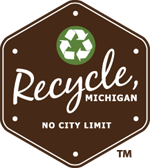Glass
Where to Recycle: Curbside Bin, Community Drop-Off and Retail Redemption Store for Bottles
In Michigan, single-serve carbonated beverages contained in glass bottles require a $0.10 deposit. When those containers are returned to the store for deposit redemption, they are recycled through product distributors.
Glass containers that are not covered under the Michigan Deposit Law are often included in community recycling programs and accepted in curbside bins. However, glass can be a challenging material to handle for the recycling industry because it can damage equipment, contaminate other recycling streams, and create working hazards. Many communities have stopped collecting glass, especially green glass because it has a low market value and can create other problems for the program.
There may be drop-off programs and other resources in your community for recycling glasses that do not go in the curbside bin such as window/plate glass, ceramics, mirrors, and more. Check with your local recycling contact to see where you can safely recycle your plate glass or find creative ways to upcycle, reuse, or repurpose damaged goods. Learn more about the world of glass recycling by visiting the Glass Packaging Institute’s Glass Container Recycling Loop page here.
What types of this material qualify for recycling?
Often, beverage bottles, food containers, and jars are the only type of glass accepted in local recycling programs because different types of glass have different melting points. Some glass is made to withstand high temperatures, while others are made to hold cold drinks.
Why is it important to recycle this item?
Glass is one of the very few materials that can be recycled endlessly without losing its strength or quality. Because glass is such a great alternative to plastic for reusable bottles and containers, many mistake the abundance of raw materials as low impact inputs. Unfortunately, we expend a significant amount of natural resources and fuel to extract and process these materials. Additionally, glass can take up to 1 million years to completely breakdown. When we recycle glass we save landfill space, reduce air pollution related to manufacturing new glass by 20%, and related water pollution by 50%.
What is glass recycled into?
When possible glass is recycled in a bottle to bottle reprocessing method which turns clean and sorted recycled glass into new containers. When collected glass has been overly contaminated or broken down into small pieces it may go to a secondary market where it is combined with other materials to create tile, filtration, sandblasting, concrete pavements, and parking lots. One common contaminant is ceramics which can be added to aggregate when producing materials in the secondary market.



